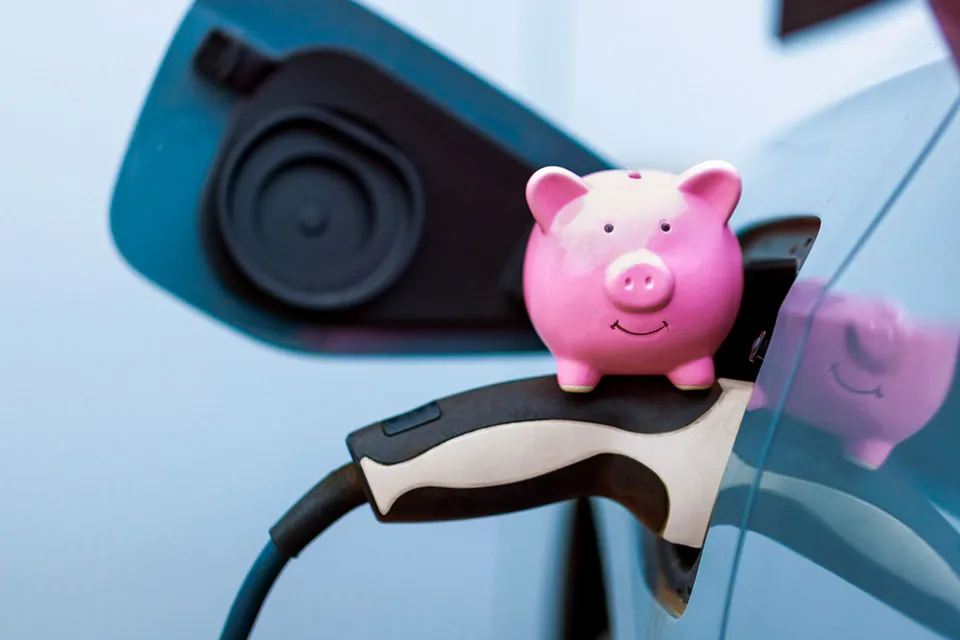How Much Can EV Owners Save Per Year?

We've all got to work within our budget, and automotive expenses can be a pain to deal with. With gas prices and repair costs rising, it's no wonder many drivers are looking for ways to cut down on their vehicle bills. That's why so many people are turning to electric vehicles; in addition to helping the environment, EVs can save you hundreds or even thousands on fuel, maintenance, depreciation, and repair costs.
Gas vs. Charging: Which is Cheaper?
One of the main ways that electric vehicle owners save money is by avoiding the pump. With fuel costs skyrocketing recently, internal combustion engine vehicles use thousands of dollars of gas each year. When you compare this to charging a battery, EVs are far more affordable to "fuel" up.
Depending on the level of charging you use, you can charge your EV at home or at a station for a very reasonable price. On average, charging an EV at your house using a level 1 charger will cost around $49 per month (link "How Much Does it Cost to Charge an Electric Vehicle" blog post here) and will provide approximately 1,250 miles of driving in that time. To compare, the U.S. Department of Energy says the average miles per gallon for cars is 24.2 miles. That means the cost will be more than $150 per month (if gas were $3 per gallon) to achieve the same mileage.
However, the exact number will vary depending on a few factors, including:
- Type of electric vehicle
- Vehicle manufacturer
- Average mileage per kWh
- Your monthly electricity costs
You can calculate your monthly charge costs by recording your monthly mileage, dividing that by your average mileage per kWh, and multiplying that number by your cost per kWh. If you plan to charge at a station, you can expect to spend between $0.25 to $0.70 per kWh to fill your battery up. Your cost per kWh will be higher if you use faster chargers, like level 3, and lower for slower chargers, like level 1 and 2.
Are EVs Cheaper to Maintain?

Because they have fewer moving parts and come with lower repair costs, EVs can be much cheaper to keep on the road. There are several components and services you just don't need to worry about when driving an EV, including:
- Engine Filters
- Spark Plugs
- Oil Changes
- Drive Belts
- Chains
- Emission Hoses
- Fuel Hoses
- O2 Sensors
- Catalytic Converters
- Transmission Flushes
While some parts may need to be replaced from time to time, the only one that may carry a significant price tag is the battery. Because an electric vehicle relies on its battery to power its engine, a faulty battery could mean your car is entirely non-operational. Luckily, batteries can last quite a while; if you have a dependable brand and good car model, you can expect your battery to last anywhere from 10 to 20 years. That being said, replacing the battery is quite costly. But again, this depends on what type of EV you have and what manufacturer makes the vehicle. A battery replacement could cost anywhere between $1500 and over $10,000.
Electric Vehicle Savings Frequently Asked Questions
How Much Do You Save Per Year with an EV?
How much you'll save each year will vary depending on how you charge your EV, what type of EV you drive, how much you pay for electricity, and what level station you utilize. The American Auto Association estimates that you can save an average of $330 annually on maintenance; the average charge for an EV is around $0.04 per mile, while fuel costs approximately $0.14 per mile. Again, your fuel costs will vary depending on how much you pay per gallon and your vehicle's fuel efficiency. Make sure to look at all the elements relating to your costs before calculating your budget and adjusting accordingly.
How Much Does an EV Depreciate Per Year?
While EVs tend to depreciate at a higher average rate than an internal combustion engine, or ICE, vehicles, their depreciation level often depends on the brand. On average, EVs depreciate 52% yearly for the first three years. But some brands, like Tesla, can hold their value quite well. A Tesla Model S, for example, will only depreciate at 36.3%, while the Tesla Model X depreciates even slower at a rate of 33.9%.
Do Electric Cars Have Good Resale Value?
Unfortunately, electric cars can struggle to hold on to their value and tend to be poor choices for those looking to sell. According to Car and Driver, the average EV will lose over $5700 in value each year for the first five years (a total of nearly $30,000.) However, some vehicle brands hold on to their value for extended periods, most notably Tesla. Because Teslas can last over 500,000 miles and often have higher demand, they can retain their value for years after their initial purchase date.
What are the Disadvantages of Owning an Electric Car?
While there are many advantages to owning an EV, it's not without its downsides. Some EV batteries are prone to malfunction and can be particularly susceptible to environmental damage. If the battery becomes submerged in salt water (for example, during a hurricane or other weather-related event near the ocean), the cells can fail and cause a fire. EVs can also have a high starting price, and if your state hasn't built enough charging stations, you may have trouble traveling far distances.
Where Can I Research EVs for Sale?
The most responsible way to approach the car-buying process is by researching beforehand, which is best done with sites like GoodCar. GoodCar has all the tools you need, including a VIN decoder and vehicle history reports. With a VIN decoder, you can determine when and where your vehicle was built. This can be very helpful with getting an EV tax credit because your car needs to have its final assembly in North America to qualify. A vehicle history report can also be helpful, as it can show you a car's accident history, number of previous owners, and any significant repairs it's undergone. The details in these reports are invaluable for negotiating better pricing, avoiding scams, and ensuring you get the best vehicle possible for your budget.
FREE Vehicle Search
- Accidents
- Problem Checks
- Title Records
- Recalls
- Values
- Specs
-
InfoPay, Inc. (dba GoodCar) is an Approved NMVTIS Data Provider
-
-
























